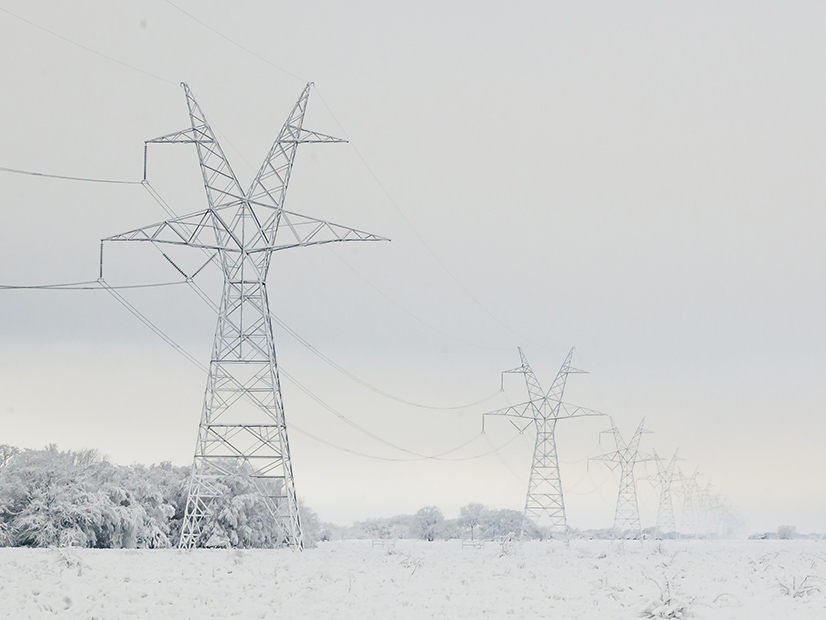
Transmission towers and lines in East Texas in 2010.
| Matthew T. Rader, CC BY-SA 4.0, via Wikimedia CommonsIn a joint filing to FERC last week, NERC and the regional entities gave their support to the commission’s proposal to modify NERC’s reliability standards in response to the ongoing impacts of climate change (RM22-10).
The comments of the ERO Enterprise came in response to FERC’s Notice of Proposed Rulemaking, issued in June, to direct NERC to update reliability standard TPL-001-5.1 (Transmission system planning performance requirements) to set expectations for long-term extreme weather planning by utilities. (See FERC Approves Extreme Weather Assessment NOPRs.) The standard is set to take effect next July, replacing current standard TPL-001-4. FERC’s proposed changes would require responsible entities to:
- develop benchmark planning cases based on historical extreme heat and cold weather events and future meteorological projections;
- use steady-state and transient stability analyses, covering a range of factors such as the grid’s changing resource mix and its performance during extreme weather, to plan for future extreme events; and
- create a corrective action plan (CAP) to mitigate any occasions where performance requirements for severe weather have not been met.
The commission also sought comment on whether standard MOD-032-1 (Data for power system modeling and analysis) should be revised to address climate change concerns, and whether drought, tornadoes or other extreme weather conditions should fall within the scope of the final rule.
TPL-001
In their comments, NERC and the REs agreed that TPL-001-5.1 is unsuited to “the risks posed by extreme heat and cold weather conditions” and called for the standard to be revised or augmented with a new standard focused on transmission planning. The ERO noted that the rising incidence of severe weather and the ongoing transition to renewable resources, both of which are directly connected to climate change, are moving forward at a rate that NERC’s standards development process has been unable to match, despite its best efforts.
“Understanding and addressing the reliability risks posed by these extreme hot and cold conditions has been a high priority of the ERO Enterprise,” the entities said in the filing, citing NERC and FERC’s joint report on last year’s winter storms, NERC’s cold weather standards project (Project 2021-07) and other weather-related work by the ERO. “The ERO Enterprise supports the commission’s attention to the role [that] reliability standards for long-term transmission planning can play in helping to address the risks posed by extreme heat and cold conditions.”
Regarding the proposed changes to TPL-001-5.1, the ERO reminded FERC that it originally suggested updating the standard during a technical conference the commission held last year — the same conference that FERC cited when it issued the NOPR in June. (See FERC Tackles Grid Planning for an Unpredictable Climate.)
Both TPL-001-4 and its planned successor “require transmission planners and planning coordinators to evaluate … wide-area events affecting the transmission system,” including severe weather, but do not require the creation of CAPs — which NERC said was “appropriate at the time” the standards were approved. However, the ERO believes these requirements are no longer sufficient for the challenges currently facing the grid, and that “there is opportunity to improve the … standard to better account for the … impacts of extreme heat and cold … and to require entities to take corrective actions [in response to] system performance issues.”
Flexibility for the ERO
While NERC and the REs endorsed FERC’s desire to revise the transmission planning standards, they did have some suggestions regarding the implementation process. In particular, the ERO asked the commission for as much flexibility as possible to “best address the considerations discussed in the NOPR.”
First, the ERO noted that “significant work would be required to develop the necessary technical foundation for a uniform planning approach [accounting] for regional differences in climate and weather patterns” that could affect how entities implement the new standard. With this in mind, it asked that FERC’s final order not limit it to the example benchmark-based development approaches listed in the NOPR.
NERC and the REs also reminded FERC that the impact of climate change does not only involve sudden crises like last year’s winter storms, but also long-term environmental conditions that can severely affect the grid over sustained periods. As a result, the ERO urged that any studies mandated by the new standard should also take these phenomena into consideration.
In regard to other extreme weather conditions, the ERO said these should be included in future versions of TPL-001, though again with consideration to the climate conditions experienced by different regions. For example, in the Western U.S., drought and wildfire risks constitute a major threat from the changing climate, while in other areas hurricanes, flooding and icing may be larger concerns.
Finally, NERC noted that MOD-032-1 already allows planning coordinators and transmission planners to request “other information … necessary for modeling purposes” from entities, including data related to extreme heat and cold conditions.“To the extent NERC’s stakeholders identify that specific revisions would be beneficial for reliability, those revisions could be included in the scope of a TPL-001 revision project; however, the commission does not need to direct revisions to reliability standard MOD-032-1 to account for any new extreme heat and cold study requirements at this time,” the ERO said.



